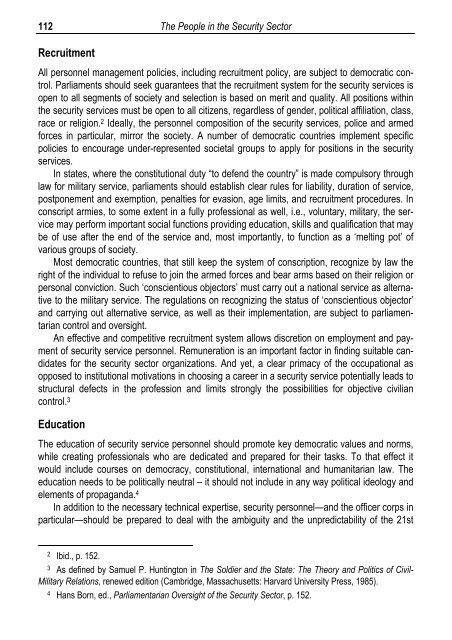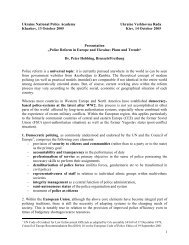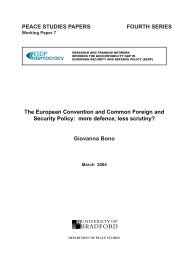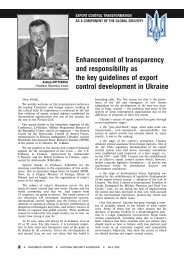Civil-Military Relations and Democratic Control of the Security Sector
Civil-Military Relations and Democratic Control of the Security Sector
Civil-Military Relations and Democratic Control of the Security Sector
You also want an ePaper? Increase the reach of your titles
YUMPU automatically turns print PDFs into web optimized ePapers that Google loves.
112<br />
Recruitment<br />
The People in <strong>the</strong> <strong>Security</strong> <strong>Sector</strong><br />
All personnel management policies, including recruitment policy, are subject to democratic control.<br />
Parliaments should seek guarantees that <strong>the</strong> recruitment system for <strong>the</strong> security services is<br />
open to all segments <strong>of</strong> society <strong>and</strong> selection is based on merit <strong>and</strong> quality. All positions within<br />
<strong>the</strong> security services must be open to all citizens, regardless <strong>of</strong> gender, political affiliation, class,<br />
race or religion. 2 Ideally, <strong>the</strong> personnel composition <strong>of</strong> <strong>the</strong> security services, police <strong>and</strong> armed<br />
forces in particular, mirror <strong>the</strong> society. A number <strong>of</strong> democratic countries implement specific<br />
policies to encourage under-represented societal groups to apply for positions in <strong>the</strong> security<br />
services.<br />
In states, where <strong>the</strong> constitutional duty “to defend <strong>the</strong> country” is made compulsory through<br />
law for military service, parliaments should establish clear rules for liability, duration <strong>of</strong> service,<br />
postponement <strong>and</strong> exemption, penalties for evasion, age limits, <strong>and</strong> recruitment procedures. In<br />
conscript armies, to some extent in a fully pr<strong>of</strong>essional as well, i.e., voluntary, military, <strong>the</strong> service<br />
may perform important social functions providing education, skills <strong>and</strong> qualification that may<br />
be <strong>of</strong> use after <strong>the</strong> end <strong>of</strong> <strong>the</strong> service <strong>and</strong>, most importantly, to function as a ‘melting pot’ <strong>of</strong><br />
various groups <strong>of</strong> society.<br />
Most democratic countries, that still keep <strong>the</strong> system <strong>of</strong> conscription, recognize by law <strong>the</strong><br />
right <strong>of</strong> <strong>the</strong> individual to refuse to join <strong>the</strong> armed forces <strong>and</strong> bear arms based on <strong>the</strong>ir religion or<br />
personal conviction. Such ‘conscientious objectors’ must carry out a national service as alternative<br />
to <strong>the</strong> military service. The regulations on recognizing <strong>the</strong> status <strong>of</strong> ‘conscientious objector’<br />
<strong>and</strong> carrying out alternative service, as well as <strong>the</strong>ir implementation, are subject to parliamentarian<br />
control <strong>and</strong> oversight.<br />
An effective <strong>and</strong> competitive recruitment system allows discretion on employment <strong>and</strong> payment<br />
<strong>of</strong> security service personnel. Remuneration is an important factor in finding suitable c<strong>and</strong>idates<br />
for <strong>the</strong> security sector organizations. And yet, a clear primacy <strong>of</strong> <strong>the</strong> occupational as<br />
opposed to institutional motivations in choosing a career in a security service potentially leads to<br />
structural defects in <strong>the</strong> pr<strong>of</strong>ession <strong>and</strong> limits strongly <strong>the</strong> possibilities for objective civilian<br />
control. 3<br />
Education<br />
The education <strong>of</strong> security service personnel should promote key democratic values <strong>and</strong> norms,<br />
while creating pr<strong>of</strong>essionals who are dedicated <strong>and</strong> prepared for <strong>the</strong>ir tasks. To that effect it<br />
would include courses on democracy, constitutional, international <strong>and</strong> humanitarian law. The<br />
education needs to be politically neutral – it should not include in any way political ideology <strong>and</strong><br />
elements <strong>of</strong> propag<strong>and</strong>a. 4<br />
In addition to <strong>the</strong> necessary technical expertise, security personnel—<strong>and</strong> <strong>the</strong> <strong>of</strong>ficer corps in<br />
particular—should be prepared to deal with <strong>the</strong> ambiguity <strong>and</strong> <strong>the</strong> unpredictability <strong>of</strong> <strong>the</strong> 21st<br />
2 Ibid., p. 152.<br />
3 As defined by Samuel P. Huntington in The Soldier <strong>and</strong> <strong>the</strong> State: The Theory <strong>and</strong> Politics <strong>of</strong> <strong>Civil</strong>-<br />
<strong>Military</strong> <strong>Relations</strong>, renewed edition (Cambridge, Massachusetts: Harvard University Press, 1985).<br />
4 Hans Born, ed., Parliamentarian Oversight <strong>of</strong> <strong>the</strong> <strong>Security</strong> <strong>Sector</strong>, p. 152.

















